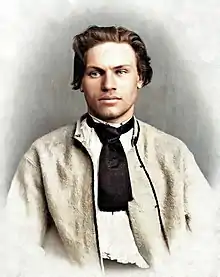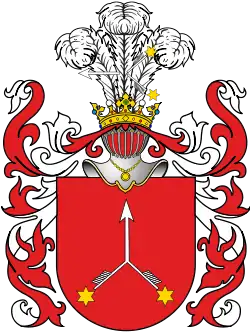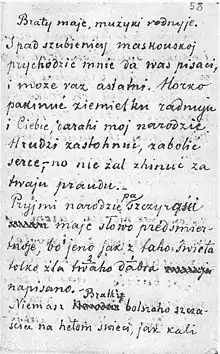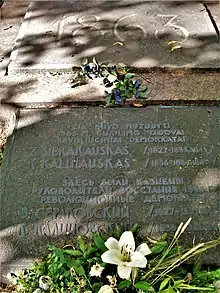Konstanty Kalinowski
Wincenty Konstanty Kalinowski, also known as Kastuś Kalinoŭski[lower-alpha 1][lower-alpha 2] (2 February [O.S. 21 January] 1838 – 22 March [O.S. 10 March] 1864), was a writer, journalist, lawyer and revolutionary from the former Grand Duchy of Lithuania that was part of the Polish–Lithuanian Commonwealth. He was one of the leaders of the failed Polish–Lithuanian Uprising of 1863.
Wincenty Konstanty Kalinowski | |
|---|---|
 | |
| Born | 2 February 1838 |
| Died | 22 March 1864 (aged 26) |
| Nationality | Polish-Belarusian |
| Alma mater | Saint Petersburg State University |
| Parents |
|
| Relatives | Viktar Otan Kalinowski (brother) |
| Family | Kalinowski family |

Kalinowski is especially revered in Belarus where he is seen as a forefather and icon of Belarusian nationalism.[1]
Early life and education


Kalinowski was born in Mostowlany, in Grodnensky Uyezd of the Russian Empire (now Mostowlany, Poland) to a szlachta family. The Kalinowski family hailed from the Polish region of Mazovia and bore the Kalinowa coat of arms. His father, Szymon, was a manager of the Mostowlany farm and manor. His older brother, Victor Otan Kalinowski would become a historian. In 1849 his father, Szymon bought a folwark near Svislach (now Belarus) where Kastuś grew up.[2]
After graduating from a local school in Svislach in 1855, Kalinowski entered the faculty of Medicine of the University of Moscow as an external student.[2] After one semester he moved to St. Petersburg, where his brother was and joined the faculty of Law at the University of St. Petersburg. Along with his brother Victor, he got himself involved in Polish students' conspiracies and secret cultural societies, headed by Zygmunt Sierakowski and Jarosław Dąbrowski. After graduating in 1860, Konstanty traveled to Vilnius where he unsuccessfully applied to join the civil service under Vladimir Ivanovich Nazimov.[2]
Career
Literary work
Konstanty then returned to the Grodno area in 1861. Konstanty started publishing Mużyckaja prauda (Peasants' Truth), the first newspaper in Belarusian, written in Łacinka, first published in June 1862.[3] The Peasants' Truth was issued seven times until 1863.[2] Konstanty also published two other Polish language newspapers.[4] Konstanty was more aligned with the Reds which represented a democratic movement uniting peasants, workers, and some clergy rather than the more moderate Whites.[2]
In his literary work, Kalinoŭski underlined the need to liberate all people of the former Polish–Lithuanian Commonwealth from Russia's occupation and to conserve and promote the Greek Catholic faith and Belarusian language. He also promoted the idea of activisation of peasants for the cause of national liberation, the idea that was until then dominated by the gentry. He favored the Polish–Lithuanian Commonwealth's traditions of democracy, tolerance and freedom, as opposed to national oppression of cultures dominated by Imperial Russia:
While the Polish Council gives all fraternal peoples self-help, the Muscovite not only does not do so, but even where Poles, Lithuanians and Belarusians lived, he opens Muscovite schools, and in these schools they teach in Muscovite language, where you will never hear a word in Polish, in Lithuanian or in Belarusian, as the people want [...][5][6]
There is some academic debate about which texts to attribute to Konstanty.[1] Konstanty was unhappy with the timing and objectives of the January Uprising, which broke out on 23 January 1863. There had been a growing rift between him and other leaders of the uprising in Warsaw.[2]
After the outbreak of the January Uprising, he was involved in the secret Provincial Lithuanian Committee in Vilnius. Soon he was promoted to the commissar of the Polish National Government for the Grodno Governorate. His writings made him popular both among the peasants and the gentry, which enabled the partisan units under his command to grow rapidly. Because of his successes he was promoted to the rank of Plenipotentiary Commissar of the Government for Lithuania (Polish: Komisarz Pełnomocny Rządu na Litwę), which made him the commander-in-chief of all partisan units fighting in the areas of the former Grand Duchy of Lithuania, which are in modern Lithuania, Belarus, eastern Poland and Ukraine.

Last months, capture, imprisonment, execution and burial
However, after initial successes against the Russian armies, the Russians moved a 120,000 men strong army to the area and the revolutionaries started to lose most of the skirmishes. Finally, Kalinowski was betrayed by one of his soldiers and handed over to the Russians.
He was imprisoned in Vilnius, where he wrote one of his most notable works — the Letter from Beneath the Gallows (Pismo z-pad szybienicy), a passionate credo for his compatriots. He was tried by a court-martial for leading the revolt against Russia and sentenced to death. On 22 March 1864, at the age 26, he was publicly executed on Lukiškės Square in Vilnius.[2]
Kalinowski's remains, along with those of others, were clandestinely buried by the Tsarist authorities on the site of a military fortress on top of the Gediminas Hill in Vilnius. In 2017, Kalinowski's remains were excavated and identified, and solemnly reinterred in the Rasos Cemetery on 22 November 2019.[7]
Legacy
During the so-called Jeans Revolution, protesters who disputed the 2006 Belarusian presidential election symbolically renamed October Square, after the Bolshevik revolution, Kalinovski Square.[8] Kalinovski Square was also the title of a documentary film about these events. In Uladzimir Karatkievich's King Stakh's Wild Hunt, one of the principal characters, Andrey Svetsilovich, had a portrait of Kalinowski above his writing desk.
During the 2022 Russian invasion of Ukraine, Belarusian volunteers fighting on the side of Ukraine formed a battalion named Kastuś Kalinoŭski,[9][10] which later transformed into a regiment.
In Ukrainian Rivne, a street was named after Kalinowski.[11]
 Belarusian commemorative stamp in honor of Kalinowski (1993)
Belarusian commemorative stamp in honor of Kalinowski (1993)
 Monument in Šalčininkai, Lithuania
Monument in Šalčininkai, Lithuania Monument in Mostowlany, Poland
Monument in Mostowlany, Poland Logo of the Kastuś Kalinoŭski Regiment (2022)
Logo of the Kastuś Kalinoŭski Regiment (2022)
See also
- Belarusization (1920s–1930s)
- Belarusian nationalism
- Belarusian national revival since the 19th century
- "Long Live Belarus!", patriotic slogan
- Soft Belarusization under Lukashenko
Related reading
- Jan Zaprudnik & Thomas E. Bird: Peasant's Truth, the Tocsin of the 1863 Uprising in: Zapisy Belarusian Institute of Arts and Sciences. Vol. 14. New York, 1976.
- Kastuś Kalinoŭski, commentaries by Jan Zaprudnik and Thomas E. Bird: The 1863 Uprising in Byelorussia: "Peasants' Truth" and "Letters from Beneath the Gallows". Byelorussian Institute of Arts and Sciences, The Krecheuski Foundation, New York, 1980.
Notes
- The name Kastuś began to be used in the 20th century.
- Belarusian: Касту́сь Каліно́ўскі, also Вінцэ́нт Канстанці́н Каліно́ўскі, Vincent Kanstancin Kalinoŭski, Lithuanian: Konstantinas Kalinauskas.
References
- Aliaksandr Smaliančuk (2015). "Kastuś Kalinoŭski and the Belarusian National Idea: Research Problems". Journal of Belarusian Studies. 7 (3): 70–78. doi:10.30965/20526512-00703004.
- Horosko, L. (1965). "Kastus Kalinouski". Journal of Belarusian Studies. 1 (1): 30–35. doi:10.30965/20526512-00101005.
- «Мужыцкая праўда»
- Michaluk, D (2015). "Polish-Language Clandestine Press Published under the Patronage of Kanstancin Kalinoŭski". Journal of Belarusian Studies. 7 (3): 79–93. doi:10.30965/20526512-00703005.
- "Kastus Kalinouski". belarusguide.com.
- "Кастусь Каліноўскі. Пісьмы з-пад шыбеніцы". knihi.com.
- "President attends January Uprising burials in Lithuania". 22 November 2019. Archived from the original on 18 August 2021. Retrieved 18 August 2021.
- Paula Borowska (17 September 2013). "Konstanty Kalinouski: A Contested Hero". Belarus Digest.
- "Беларусы стварылі батальён імя Каліноўскага для абароны Кіева". Euroradio. 9 March 2022.
- Max Bearak (1 April 2022). "A Belarusian battalion fights in Ukraine 'for both countries' freedom'". Washington Post.
- "У Роўне з'явіцца вуліца Кастуся Каліноўскага" (in Belarusian). belsat.eu. 2022-04-05.
External links
![]() Belarusian Wikiquote has quotations related to: Kastuś Kalinoŭski
Belarusian Wikiquote has quotations related to: Kastuś Kalinoŭski
- Website about Kalinowski (in Belarusian)
- Biography of Konstanty Kalinowski, belarusguide.com
- Archival documents and materials - 1863-4 uprising in Belarus
- Why have Belarusan authorities forgotten Kastuś Kalinoŭski uprising?
- Konstanty Kalinowksi biography, belarus-misc.org
- Каліноўскі як далакоп беларускай мовы, 3 December 2013, in Belarusian